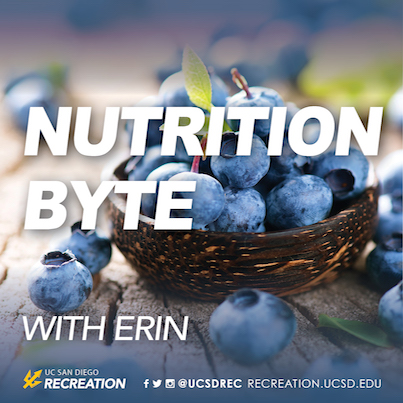By Erin Kukura, MS, RD, UCSD Recreation Dietitian
You’re probably getting used to being at home 24/7 and figuring out how to keep some sense of normalcy. Figuring out how to eat with all of this can be challenging. Luckily, here are a few tips when it comes to eating while working from home:
1.Maintain a sense of routine.
Keeping some level of consistency does wonders for your mental health. Try to go to bed and wake up and the same time, start and end your workday consistently and fit in your daily movement (online yoga class, bootcamp or other workout). Keeping consistency with normal eating times is also crucial. Working from home means you have more leeway with what you’re able to eat, but for a lot of people can lead to snacking when feeling bored, stressed, or any other emotion. Keeping consistent meal and snack times can help decrease some of this. Additionally, using this time to take a little break can also help to make sure you’re enjoying that meal and decreasing stress levels. Aim to eat every 4-5 hours (depending on your hunger/fullness levels).
2. Practice mindful eating.
We’ve all heard of the amazing benefits with eating mindfully. Now is the perfect time to pick a meal, even once per day to slow down and eat mindfully. Try eating that meal with no immediate distractions (ie, not at your work from home station or in front of the TV). Practice savoring your meal, what do you taste, smell, what do you notice in terms of your hunger and fullness cues. Building this awareness now might help once you do return back to normalcy at work or school.
3. Differentiate between Emotional and Physical Hunger
When you’re reaching for food maybe stop to ask yourself are you eating out of physical or emotional hunger. Emotional hunger generally is immediate for a specific food item, that results in guilt and shame after eating. Physical hunger is noticing you’re stomach rumbling, feeling low energy, mood change (ie hangry), or difficulty concentrating. Now, we all eat out of emotional hunger at times, especially now, but we want to be mindful of how often we use this coping mechanism. So taking some time to build that awareness might help you to be proactive in incorporating other skills (calling a friend, moving your body, working on a puzzle when that urge arises).
4. Prepare what you can.
We’ve all seen the chaos at the grocery stores. Right now you’re meals might resemble a hodge podge of food and that’s ok. Do what you can to try to get a balance of nutrients (grain + protein + produce) at each meal, but if it’s coming from hashbrowns + eggs + canned green beans, awesome! We’re all doing the best we can with what we have right now.
5. Aim to purchase and eat foods that are going to sustain you.
Junk food and caffeine can lead to blood sugar spikes, crashes and even increase anxiety. Eating more nutritious foods (even if canned or frozen) are going to lead to better energy levels overall.
6. Be compassionate with yourself.
We’re all doing the best we can and we’re all in this together. Now, more than ever we need to make sure we incorporate connection, movement, ample food, sleep and pleasure into our lives.
You can schedule an appt with UCSD Recreation’s Registered Dietitian, Erin online at: https://recreation.as.me/schedule.php?appointmentType=category%3ANutritional+Counseling
All sessions will be done via Zoom (you can call or video in).
Feel free to e-mail Erin directly at ekukura@ucsd.edu


